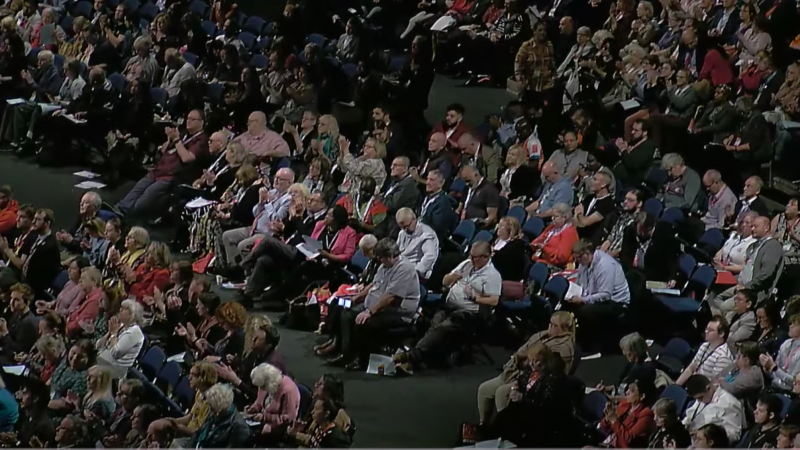
Delegates at Labour’s annual conference have passed motions calling on Labour to recognise a “legal duty of care” regarding the climate change and biodiversity emergencies and to support making misogyny a hate crime.
Violence against women and girls, composite motion 11, passed on a show of hands. The motion, put forward by Ribble Valley CLP, calls on Labour to campaign to make misogyny a hate crime to be recorded as such by all police forces across the UK and prosecuted by the Crown Prosecution Service.
The motion urges the party to require police forces to record all instances of femicide and assess the extent and impact of incel (involuntary celibate) groups both online and offline.
Climate crisis, composite motion 12, was also carried by delegates on a show of hands The motion, moved by SERA, calls on Labour in government to recognise a “legal duty of care” regarding the climate change and biodiversity emergencies and recognise the UK’s international legal responsibilities in that area.
The motion demands that the party offer a programme that shows “global climate and energy policy leadership” and work with UK nations, local authorities, FE colleges, businesses and unions to devise and deliver the training necessary for the skilled workforce required to achieve its renewables and energy efficiency plans.
Below is the full text of the composite motions considered this afternoon.
Violence against women and girls – composite motion 11
Women and girls in Britain are suffering from misogyny, expressed in sexual harassment, domestic abuse and death.
Currently, not all police forces around the country record misogyny.
We call upon the Labour Party to campaign for the following:
- Legislation to make misogyny a hate crime to be recorded as such by all police forces across the UK and prosecuted by the Crown Prosecution Service. Currently only 12 police forces do this.
- That police forces should be required to record all instances of femicide, the killing of a woman or girl by a man, with immediate effect.
- Assess the extent and impact of incel (involuntary celibate) groups both online and offline and to work with voluntary groups and experts who have already begun work in this field.
- That policing resources should be increased to ensure that police forces are able to deal with these new responsibilities.
Mover: Ribble Valley CLP
Seconder: South Ribble CLP
Climate crisis – composite motion 12
Conference notes:
- Climate change is an existential threat to humanity. Solving this crisis will impact on all aspects of society.
- Environmental harms extend beyond borders. Countries around the world, including the UK, are experiencing climate change related extreme weather events, including extreme temperatures, devastating flooding, wildfires, hurricanes, and droughts. This is with warming at 1.2°C above average pre-industrial levels.
- Residential and commercial buildings are among the largest contributors to climate change, accounting for a quarter of the UK’s greenhouse gas emissions.
- Soaring energy bills are among the main drivers of the current cost-of-living crisis. Even before the recent spike in energy bills, 12% of households in Wales and 13% in England were already classed as fuel poor.
- Millions of British families and tens of thousands of British businesses are struggling to pay their bills now, yet the Conservatives will allow bills to increase further in October.
- Peatlands in the UK contain an estimated 3,200 million tonnes of carbon, more than the forests of the UK, France and Germany combined and roughly ten times Britain’s annual CO2 emissions. While peatland should be a net carbon sink, British peatlands are currently emitting over half a million tonnes of carbon dioxide a year. In the UK, at least 80% of peatland habitats have been lost or damaged by human activity. Moorland fires have been increasing year on year in the UK as a result of climate change.
Conference believes:
- The UK has had the largest energy price increases of any European country because of Conservative government policy failures: gutting energy-efficiency subsidies, effectively banning onshore wind in England and scrapping the zero-carbon homes standards – measures introduced by the last Labour government.
- Issuing new UK oil and gas licences and removing the ban on fracking won’t reduce UK energy bills quickly: it will increase climate change-causing carbon dioxide and methane emissions.
- The quickest, cleanest and most cost-effective way of reducing UK energy bills and UK greenhouse gas emissions is to prioritise a rapid expansion of renewable energy and energy efficiency.
- Increased moorland fires present a threat to wildlife and to the mental, physical and economic wellbeing of human beings who use moorland. Current land management practices in British uplands, such as controlled burning of peatland habitat for grouse shooting, have contributed to increased flooding and have a detrimental effect on biodiversity. The restoration of British uplands presents an opportunity to create many green jobs in the revegetation and rewetting of peat bogs.
Conference recommends a Labour government must:
- Recognise a legal duty of care regarding climate change/biodiversity emergencies.
- Recognise international legal responsibilities.
- Offer a programme that shows global climate and energy policy leadership, working with UK nations, local authorities, FE colleges, businesses and unions to devise and deliver the training necessary for the skilled workforce required to achieve its renewables and energy efficiency plans.
- Support an immediate state-coordinated strategy for retrofitting buildings across the UK, to reduce energy consumption and household bills.
- Deliver the policy changes necessary to rapidly scale-up onshore and offshore renewables and prevent fracking and new coal mines.
- Invest in the maintenance and conservation of British peatlands to transform them into a carbon sink, reduce flood risk, prevent moorland fires, prohibit peatland burning and improve biodiversity.
Mover: SERA
Seconder: Delyn CLP




More from LabourList
‘It’s one year since I became Britain’s youngest MP. Here’s what I’ve achieved so far’
Tribute: ‘David Lipsey’s joie de vivre is missing in Labour politics today’
Ellie Reeves: ‘One year in, the next phase begins – focused on living standards’